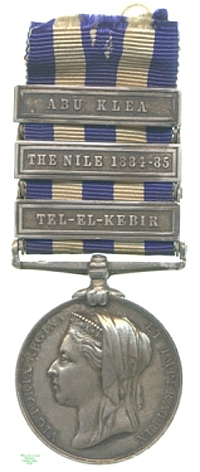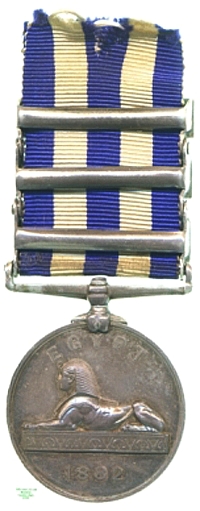
Obverse, a bust of Queen Victoria with veil

Reverse, the Sphinx on a pedestal facing left

Obverse, a bust of Queen Victoria with veil |

Reverse, the Sphinx on a pedestal facing left |
Victorian-period Egypt was technically a dependency of the Ottoman Empire, but in fact the Khedive, Tewfik Pasha, was effectively in the hands of Britain and France, for whom control of the Suez Canal was a strategic necessity. Egypt's shaky economic situation endangering this, in 1879 Britain and France took over government in an arrangement of dual control. This foreign influence was much resented in Egypt, and especially within the army. A Colonel by the name of Ahmad Urabi (Arabi Pasha) became the spearhead of the movement, which launched a coup in 1882. After some international indecision the coup was suppressed by British arms, the final blow to the uprising being the Battle of Tel-al-Kebir, where a British force of 17,000 men under General Sir Garnet Wolseley stormed a superior Egyptian force in heavily-defended positions in a surprise attack by night. Urabi was captured and exiled to Ceylon.
The other bars of the medal relate to a later campaign, against Sheikh Muhammad Ahmad ibn al-Sayyid 'Abd Allah and his allies, who after the proclamation of Muhammad Ahmad as Mahdi (the legendary final redeemer of Islam) in 1881 threatened to remove the Sudan, technically an Egyptian possession, entirely from the Khedive's control. Several serious defeats of Egyptian forces in 1884 led to a concerted British campaign, but control could not be recovered. The British withdrew their forces to Egypt and to Khartoum, where General Gordon defended the city whilst awaiting a relief column that, beset by Mahdist attacks, arrived too late.
The bar for Nile 1884-85 indicates that the recipient was a member of that ill-fated relief expedition, and the other indicates that he fought with it against Mahdist attacks at Abu Klea. He was Sapper A. Winzer, of the 26th Company of the Royal Engineers. Lester Watson purchased the medal at some point before 1928.